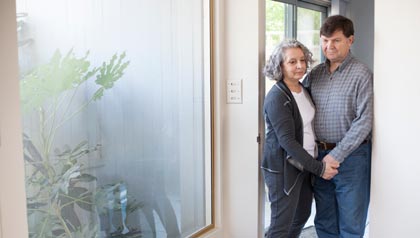AARP Hearing Center

By Andrew Tuttle
• At first, Joyce Johnson dismissed her husband’s unusual responses to social situations as stress. But then he developed issues at work. In 2007, Craig, then 55, underwent tests that determined he had early onset Alzheimer’s disease.
“I remember feeling an absence of oxygen in my own brain,” Joyce said of her reaction. “It didn’t seem real.”
Joyce, now 60, contacted the Alzheimer’s Association of Oregon, which was beginning its first “Early Memory Loss” classes and support group. The Johnsons, who live near Portland, also spoke at the association’s annual McGinty Conference on Alzheimer’s, which brings together caregivers and experts on Alzheimer’s in Oregon. Last year Joyce attended an AARP Oregon workshop on dealing with Alzheimer’s, and they have been involved in several other Alzheimer’s-related classes and groups.
Now Joyce attends a couple of support groups each month, and Craig goes to the Mt. Hood Adult Day Center for half a day three times a week.
“I have found that I need to go to support groups to hear other caregivers talk about their experiences.” Joyce said. “It helps me know I am not alone and gives me ideas for handling different challenging situations and feelings.”
Feeling isolated is common
More than 678,000 Oregon residents were caring for an ill or frail family member at home in 2009, according to an AARP Public Policy Institute report. Many have little or no support.Whether it’s tending to a spouse, a parent or some other family member with medical limitations, caregiving can be very difficult and emotional.
“There are many reasons why people may feel alone,” said Bandana Shrestha, AARP Oregon director of community outreach. “Family issues are private, and often people focus inward when a caregiving situation arises. But there are many different resources available.”
Among them is the AARP website’s Caregiving Resource Center. It provides a large collection of tools for any age group and situation. Caregivers and patients can join online chats with caregivers and caregiving experts, sign up for webinars and even conduct their own research. They also can find help and support through online message boards and support groups.
“Caregivers are the backbone of our long-term care system and, by recognizing that, AARP continues to address the changing needs of society and the pressing needs of older Americans,” Shrestha said.
ADRC coalition of resources
Another free resource is the federally funded Aging and Disability Resource Connection of Oregon, which started in 2009 and has three pilot sites covering the northwestern part of the state. It’s expected to be available statewide by 2016. The ADRC is an umbrella coalition of social service agencies that seek to find the best resources available. A caregiver is connected with a counselor, who helps the caregiver develop a plan based on the individual’s situation.
“It’s very person-centered,” said Kristi Murphy, an ADRC program analyst. “We … tell them they are not alone, there are options, and [we] help them connect the dots.”
Having so many caregiving resources can be overwhelming and confusing, Murphy said, noting that during a forum with AARP Oregon last year, caregivers said they didn’t know where to turn.
AARP Oregon is working closely with local Area Agencies on Aging, which administer the National Family Caregiver Support Program. Services offered include counseling, training and respite support for caregivers.
AARP Oregon is also supporting programs geared to Native Americans by sponsoring the eighth annual Native Caring conference held March 27-28 in Lincoln City and organized by the nine tribes of Oregon.
Andrew Tuttle is a freelance writer in Tualatin, Ore.































































